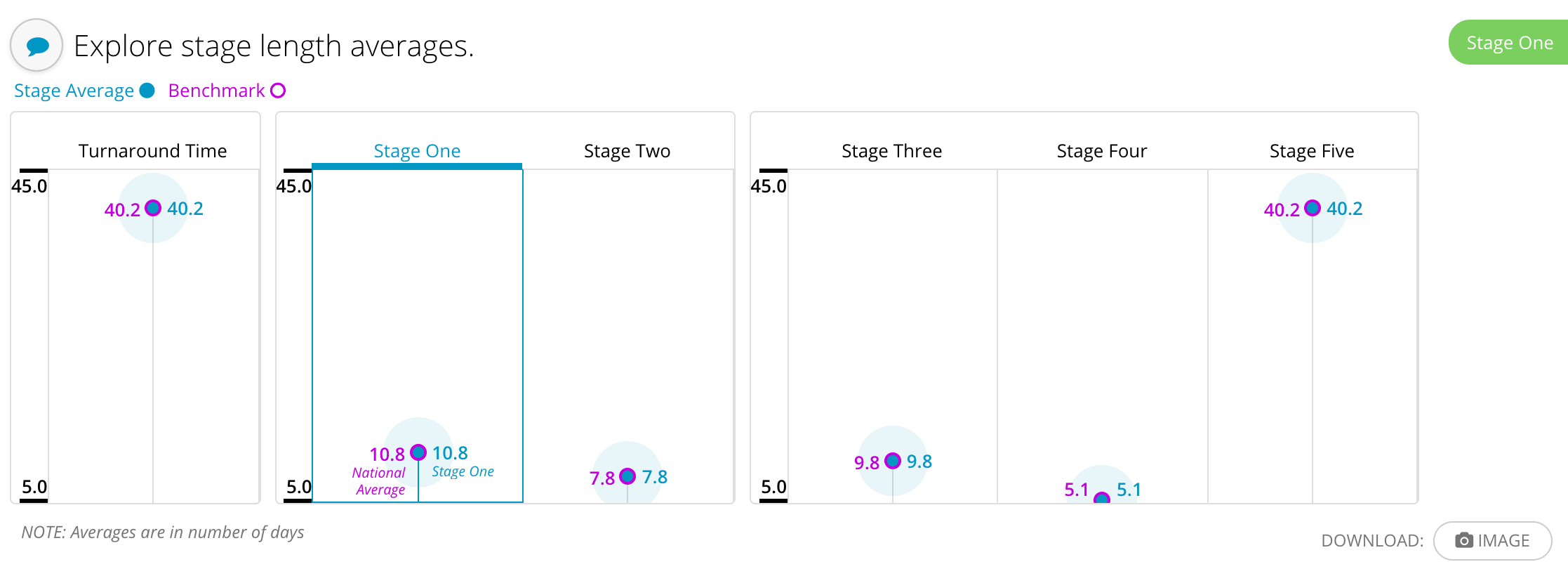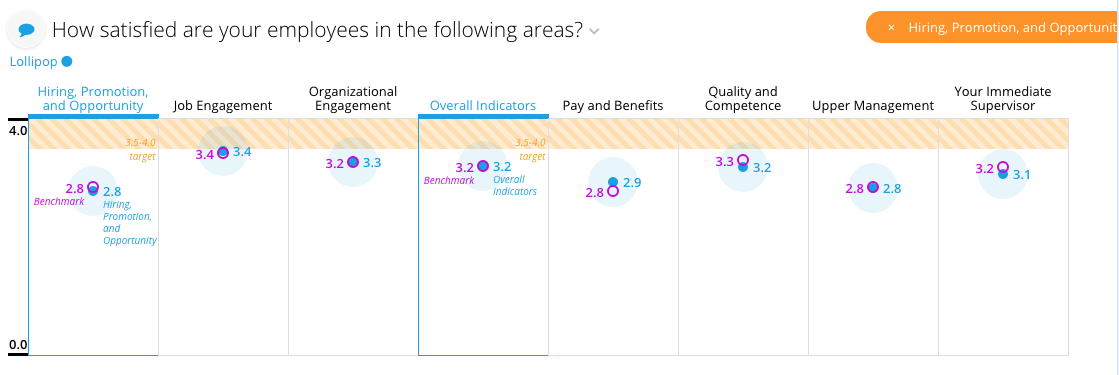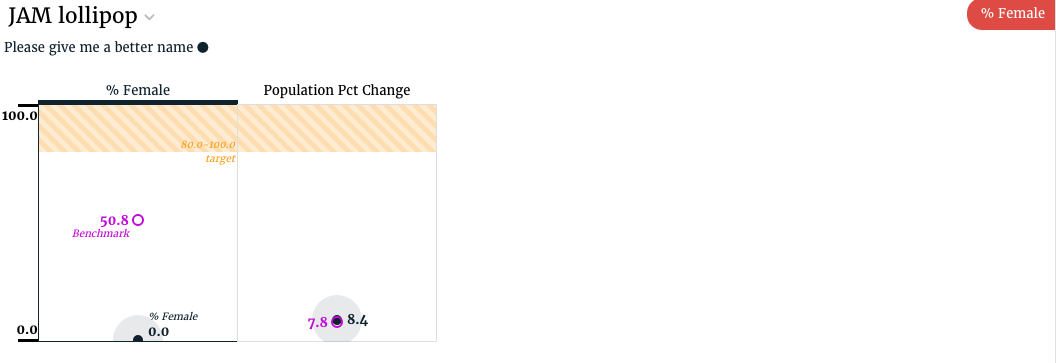Lollipop¶
Warning
This help isn’t complete. It may even look terrible. If you want to work on it, see How to Contribute. You can also ask for help in the Juice Slack #documentation channel.
Contents
A Lollipop slice is used to present the user with a view of the data plotted into sections with a stick and ball presentation of the current value mapped against a target and an optional benchmark comparison recipe.
Lollipop config¶
Lollipop slices support the Common configuration options for all slices. Additional options are:
blockWidthRange¶
Lollipop section (container of a single lollipop) preferred width range (in px)
| Optional: | Yes, if it is not defined, lollipop section widths become dynamic |
|---|---|
| Values: | An array of two integers: [min, max] number (in pixels) |
| Example: | config:
blockWidthRange: 50
|
showGroupTitle¶
Indicates whether the group title should be displayed
| Optional: | Yes, default is |
|---|---|
| Values: | boolean |
| Example: | config:
showGroupTitle: true
|
showStick¶
Displays/hides the main lollipop’s stick (the one that connects base line to the point)
| Optional: | Yes, default is |
|---|---|
| Values: | boolean |
| Example: | config:
showStick: true
|
groups¶
Defines min|max|showScales for each lollipop group (group name is the
key). You can set a default for all groups by specifying default as
the key.
| Optional: | Yes, default is: min/max are dynamic, showScales is |
|---|---|
| Values: | JS object |
| Example: | config:
groups:
group_a:
max: 100
min: 0
showScales: true
|
itemLinks¶
Use only with LollipopLinkableItemsViewMixin, which enables URL
navigation on lollipop clicks. itemLinks object is a map with the key
(the id of an lollipop item) and the value (the url this item links to)
| Optional: | Yes |
|---|---|
| Values: | JS object |
| Example: | config:
itemLinks:
overall_score: compliance/overall
knowledge_score: compliance/knowledge
|
Flavors for Lollipop¶
Default (lollipop)¶
The default flavor provides the most flexible behavior. The default flavor is used when you have a flat structure with a list of metrics across a (possible) single dimension with a comparison recipe. Typically one or two rows are in the results. A lollipop segment is rendered for every metric. It accepts a render_config object with various options passed in.
The default flavor, with no render_config provided would look something like:
class LollipopV3Service(CensusService):
def build_response(self):
self.metrics = ('pctfemale', 'pctdiff')
benchmark = self.recipe().dimensions().metrics(
*self.metrics).apply_global_filters(False)
recipe = self.recipe().metrics(*self.metrics).dimensions(
*self.dimensions).apply_global_filters(True).filters(
*self.filters).compare(benchmark)
self.response['responses'].append(recipe.render())
The slice in stack.yaml:
- slice_type: "lollipop"
slug: "lollipop"
title: 'How satisfied are your employees in the following areas?'
data_service: "EIDataServices.LollipopService"
It is possible to supply a separate set of comparison metrics for the
benchmark. In order to do this, the comparison metrics must be supplied to
the benchmark recipe, and the list of metrics and comparison metrics must
be supplied via a render_config dictionary. Additionally, when supplying
comparison metrics, an empty suffix must be passed as an argument in the
compare method. For example, in the code block below, the benchmark recipe
uses separate national averages.
class LollipopService(OverviewService):
def build_response(self):
self.metrics = ('turnaround_avg', 'stage_1_avg', 'stage_2_avg',
'stage_3_avg', 'stage_4_avg', 'stage_5_avg')
comparison_metrics = ('national_tat_avg', 'national_1_avg',
'national_2_avg', 'national_3_avg',
'national_4_avg', 'national_5_avg')
benchmark = self.recipe().metrics(*comparison_metrics)\
.apply_global_filters(False)
recipe = self.recipe().metrics(*self.metrics).compare(benchmark,
suffix='')
render_config = {
'metrics': ['turnaround_avg', 'stage_1_avg', 'stage_2_avg',
'stage_3_avg', 'stage_4_avg', 'stage_5_avg'],
'comparison_metrics': ['national_tat_avg', 'national_1_avg',
'national_2_avg', 'national_3_avg',
'national_4_avg', 'national_5_avg'],
}
It is also possible to override the default comparison label and
target range by supplying a render_config dictionary to the render()
method. For example, the code below will change the shaded target band to
range from 3.7 to 4.1 and change the word Benchmark to Cookies in the
displayed output.
class LollipopV3Service(CensusService):
def build_response(self):
self.metrics = ('pctfemale', 'pctdiff')
benchmark = self.recipe().dimensions().metrics(
*self.metrics).apply_global_filters(False)
recipe = self.recipe().metrics(*self.metrics).dimensions(
*self.dimensions).apply_global_filters(True).filters(
*self.filters).compare(benchmark)
render_config = {
'target': [3.7, 4.1],
'comparison_label': 'Cookies'
}
self.response['responses'].append(
recipe.render(flavor='single_benchmark',
render_config=render_config)
)
In order to separate the lollipops into groups, a list of groups and the
metrics associated with each group must be supplied as a part of the
render_config dictionary. The renderer expects the groups to be a list of
lists, where the first item in the group is the name of the group, and the
second item is a list of the metrics in that group. If no groups are supplied
in render_config, the renderer will create a default group, using all of the
metrics in the recipe. For example, the code block below will create three
groups (the two groups listed, and a third group that uses the remaining
metrics not used with other groups).
class LollipopV3Service(OverviewService):
def build_response(self):
self.metrics = ('turnaround_avg', 'stage_1_avg', 'stage_2_avg',
'stage_3_avg', 'stage_4_avg', 'stage_5_avg')
benchmark = self.recipe().metrics(
*self.metrics).apply_global_filters(False)
recipe = self.recipe().metrics(
*self.metrics).apply_global_filters(True).compare(benchmark)
render_config = {
'groups': [
['turnaround_lollipop', ['turnaround_avg']],
['stage_1_and_2', ['stage_1_avg', 'stage_2_avg']]
]
}

Single Dimension (lollipop)¶
The single dimension flavor is used when you want a lollipop slice for each distinct value of a single dimension for a single metric with a comparison recipe. Typically multiple rows are in the results.

The code for the single dimension flavor looks as follows:
class LollipopService(EIService):
def build_response(self):
self.metrics = ['c_meanscore', 'c_db_meanscore']
benchmark = self.recipe().metrics(*self.metrics).dimensions()
self.dimensions = ['category']
recipe = self.recipe().metrics(*self.metrics).dimensions(
*self.dimensions).order_by('category').compare(benchmark)
self.response['responses'].append(
recipe.render('Lollipop', flavor='single_dimension'))
The slice in stack.yaml:
- slice_type: "lollipop"
slug: "lollipop"
title: 'How satisfied are your employees in the following areas?'
config:
style:
- "section-content"
"defaultToggleItem": {"id": "", "label": ""}
"showGroupTitle": false
"groups":
"default":
"max": 4
"showStick": true
mixins:
"options": {}
"target": "view"
"class": "WithFilterChange"
data_service: "EIDataServices.LollipopService"
Single Benchmark (lollipop)¶
The single benchmark flavor is used when you have a flat structure with a list of metrics across a single dimension with a comparison recipe. Typically one or two rows are in the results. A lollipop segment is rendered for every metric.

The code for the single benchmark flavor looks as follows:
class LollipopV3Service(CensusService):
def build_response(self):
self.metrics = ('pctfemale', 'pctdiff')
benchmark = self.recipe().dimensions().metrics(
*self.metrics).apply_global_filters(False)
recipe = self.recipe().metrics(*self.metrics).dimensions(
*self.dimensions).apply_global_filters(True).filters(
*self.filters).compare(benchmark)
self.response['responses'].append(
recipe.render(flavor='single_benchmark'))
The slice in stack.yaml:
- slice_type: "lollipop"
slug: "lollipop-jam1"
title: "JAM lollipop"
config:
"groups":
"default":
"max": 100
"minSelections": 1
"showStick": true
data_service: "censusv2service.LollipopV3Service"